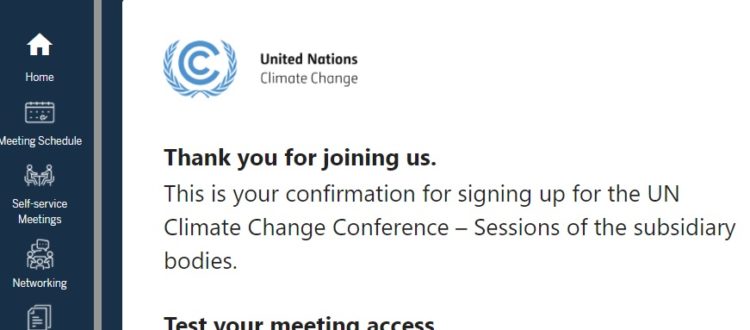The (online) return of climate diplomacy
By Jacopo Bencini, ICN Policy Advisor
On the 31st of May, after a year and a half of delay due to the pandemic, the climate change negotiations are back in a digital format: the traditional intermediate negotiations which normally would take place in Bonn (Germany) will be carried out completely online, so as to allow the delegates from each country to participate.
For the first time the negotiations will be online for three weeks across three different time zones. They will take place from the 31st of May to the 17th of June with each week taking place according to three different time zones. Following the standard Italian time, the first work session will be from 15:00 to 18:00, the second from 23:00 to 02:00 and the third from 05:00 to 08:00. This calendar is the result of months long discussions between the different delegates and the secretary on the theme of the participation. It was in fact necessary to go online so to allow all the countries to participate, regardless of their differing time zones and their economic situation, in at least a third of the work sessions organised in their time zone. The same logic for going online was also applied for the participation of the global civil society organisations that act as observers.
As per normal, the Italian Climate Network (ICN) will follow the intermediate negotiations from the inside. This year there will be the highest amount of delegates from the ICN: sixteen volunteers and ICN experts will follow the sessions and they will report (in Italian) on the ICN website and on social media what will take place during the climate negotiations.
After a year and a half, the negotiations are running again with a lot to talk about. 2020 was the year of worldwide restrictions applied to prevent the spread of the pandemic which, as a result, led to the reduction of the total carbon dioxide emissions by 6.4%, compared to the year before. It is doubtful that this will mean that there will be no increase to prior levels. The climate goals signed in the Paris Agreement seem to still be very far off. We need the government’s effort to stop the current climate catastrophe. With the mitigation measures proposed through the NDCs (the maximum contributions determined on a nation level according to the agreement) there have been “zero net emission” promises emerging from the leaders’ summit on climate last April by the USA President Joe Biden. Even then, this promise will still lead to global warming between 2° and 2.4° by the end of the century. In Article 2 of the Paris Agreement the countries committed themselves to keep it under 1.5°. This recent promise is still a better scenario if we compare it to a few years ago, but it’s still too little compared to what we are going to face.
Let’s dispel the myth. During the negotiations, epochal decisions are not always taken, especially during the technical intermediate sessions. This is particularly true this year’s negotiations where there are no important votes due to participation issues and the absence of informal moments of political exchange and confrontation. As such, the most important decisions are postponed to the next COP26 in Glasgow.
Even if they are intermediate, the upcoming negotiations represent a useful moment to understand the practical intentions of both the most polluting and the most politically influential states. These intentions will be understood by following the discussions on the budget, transparency, development of Article 6 of the Agreement and Cooperation, and the actualisation of the existing rules and prospective towards the Scottish COP.
According to Serena Giacomin, President of the Italian Climate Network “even if the multilateral negotiation is a small step, it is part of a tiring but fundamental path in which the international community must work together to increase the level of ambition in order to create the political, social, cultural, financial and technological conditions for the quickest transition to take us out from the fossil fuel system over the next three decades.”
The team of volunteers and experts of Italian Climate Network will monitor each session and will create articles and specific news pieces for the Italian audience. The content will be published across our channel to allow the Italian audience to receive weekly updates and to follow the return of climate diplomacy, this time online.

